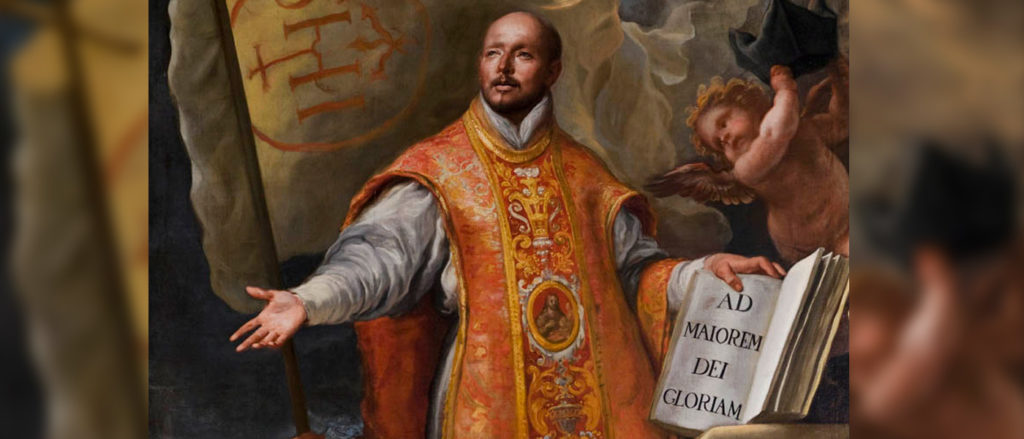
Chap. 8 Change of Plans
This was another trip that Ignatius would take by himself. He took a pony for the journey and made the slow trek back to northern Spain. It was a painful trip not only because of the gallstones in his side but because of the tension that still existed between him and his relatives. His family didn’t approve of the new life he was living, and he didn’t approve of the old life they were living. He wanted to give up everything he had and serve God, and they wanted to keep everything they had and enjoy a life of wealth. When he arrived in Azpeitia he refused to stay in the Loyola mansion. He lived a simple life now and didn’t want the comforts that come with high society. There was also much good that needed to be done in his hometown, so he stayed at the local shelter for the poor and the sick, much to the dismay of his family.
His relatives came to see him anyway, but they were shocked by his appearance. He wasn’t wearing fine clothes anymore but looked like a beggar. He didn’t have the long boots and cape of a knight but a dark brown tunic and worn-out sandals. He also seemed thinner now, and he looked older. Some people didn’t recognize him at first, but it was definitely Ignatius, and reports about what he had done in western Spain and France had reached his hometown. Many came out to see him.
Every day he would preach to anyone willing to listen, not only the people staying at the shelter but visitors as well. He especially wanted to teach children about God, and they came in increasing numbers each day, most of them about ten to fifteen years old. The crowd grew so large that he decided to use the church so everyone could hear, and when that didn’t work, he would take everyone outside just to have enough room. People traveled from nearby villages to hear Ignatius preach, and many people had to climb trees just to catch a glimpse of him since the crowd was so vast. His brother came out to witness these things and was astounded by the huge following that Ignatius had. When Ignatius preached, he spoke passionately to the people. He wanted the kids to know that even if they made mistakes, they could still grow up to be a good person. He told them about the time he was a teenager and stole fruit from someone’s tree, but another boy got punished for it. He regretted not taking responsibility for it, and he hoped the boy forgave him for not speaking up. People should always admit when they’ve done something wrong.
Ignatius also wanted adults in the town to take responsibility for their sins and to amend their ways. He encouraged married couples going through hard times to put more effort into their marriages. Some of them listened to Ignatius, and several marriages were saved because of his advice. He also told husbands who left their wives that they needed to return to them and act as faithful husbands. He tried to get rid of gambling and prostitution too, which were problems he knew a lot about from his own youth. Three women were deeply moved by his words and gave up prostitution permanently. One even became a nun.
Ignatius also tried to have a positive effect on his own household, even if he refused to stay with them. There was a boy that had an ugly face, and everyone in the town made fun of him for it. He was the son of the woman who nursed Ignatius when he was a child, and Ignatius scolded anyone who teased the boy, predicting that the boy would become someone great some day. Eventually the boy grew up and became a priest. Ignatius also knew that some of his brothers were cheating on their wives, and one night he stood outside the Loyola mansion and prevented the mistress of one of his brothers from sneaking inside through a secret entrance. She had been having an affair with his brother, and Ignatius got her to confess her sin and go home quietly. Ignatius’s brother was not amused.

Many people in the town began to regard Ignatius as a saint, and they believed some of the deeds he performed were miraculous. There was a person who was sick with epilepsy, which caused him to have uncontrollable seizures. Ignatius touched the epileptic person, and he immediately calmed down and returned to normal. Another person had a problem with her lungs, and she began to feel better the day after Ignatius visited her. After Ignatius’s death, the townspeople would recall these things and claim that they were proof he was a saint.
Ignatius’s own health started to improve during his three months in Azpeitia, but he still got sick at times. His family wanted him to have a more comfortable bed to sleep in, so they carried his bed from the Loyola mansion to the shelter where Ignatius was staying, but he refused. He wanted to live the same humble life that the people in the shelter did. Besides it was the same bed he slept in when he recovered from his cannonball injury, and it probably brought back difficult memories for him. Even still the gallstones continued to bother him, and his nieces pleaded with him to come home. He eventually agreed and spent one night there, although he left early the next morning without telling anyone. He returned to the shelter and made plans to travel to Italy to reunite with his companions so they could sail to Jerusalem. Some of his relatives accompanied him on horseback for part of the way and said their farewells as Ignatius departed from the Basque region of Spain. He felt well enough to walk again, so he left the pony with them to bring back to Azpeitia. The people loved Ignatius so much that they gave special treatment to his pony after he left. They pampered it, letting the pony walk through whatever field it wanted and eat whatever it wanted to eat.
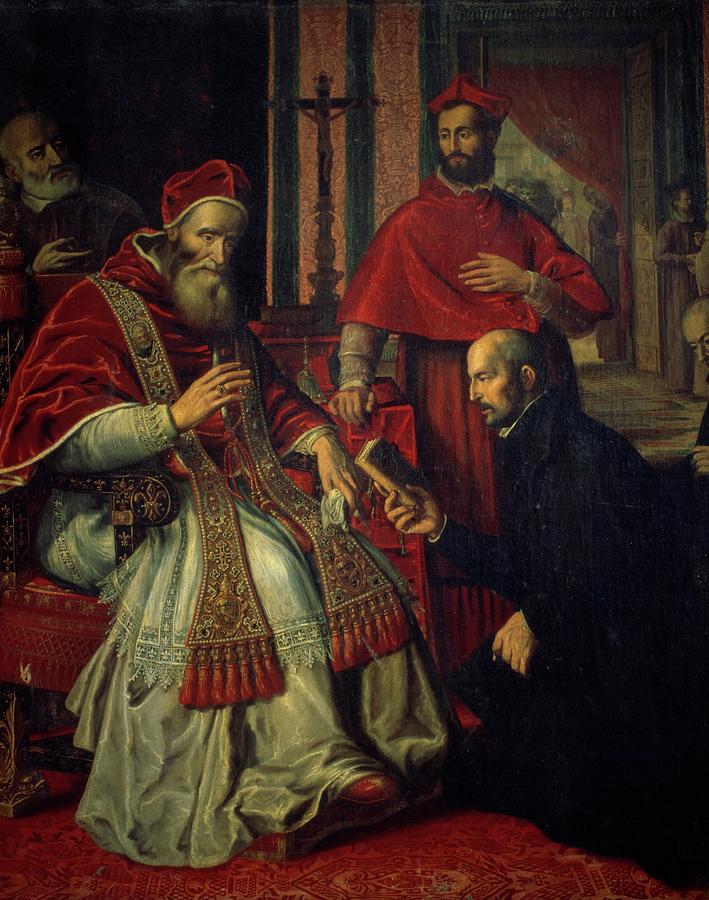
There was a lot of time before ships would set sail for the Holy Land, so Ignatius took his time getting to Venice. The families of many of his companions lived in northern Spain, so he met with several of them to let them know their sons were doing well. He delivered letters on their behalf, which was important since the Xavier family had once been at war with Ignatius’s family. Francis Xavier wrote a letter that he gave to Ignatius to deliver to his family, explaining to his relatives that Ignatius was a good man and a good friend. Ignatius even had time to visit with his old friends from Alcalá, but unfortunately they weren’t interested in joining his new group of friends on their trip to Jerusalem.
There were still four months to go before the ship would leave the harbor in Venice, and Ignatius tried to make the most of his time. He needed to study more theology to finish the degree he started in Paris, and he planned to stop at the famous university in Bologna to continue his studies. He barely survived the trip there. The deadly pirate Barbarossa was lurking on the high seas at this time, and everyone warned Ignatius not to sail to Italy since they might get kidnapped. Fortunately this didn’t happen, but the ship taking him from Spain to western Italy lost its rudder during a violent storm and nearly sank. When he made it to the coast of Italy he walked to Bologna, but the path through the mountains became so high and so narrow that he almost fell off a cliff. He had to crawl on the ground and grasp the bushes on the side just to prevent from slipping into the ravine below, and he described it as the most physically demanding experience of his life. Yet he made it safe and sound. A short while later he fell off a wooden bridge while crossing a creek, and he became drenched and covered in mud. Everyone who saw it laughed at him, but the accident caused him problems later. Getting wet while out in the cold caused him to get sick again. He made it to Bologna but couldn’t go to school as planned since he needed all that time to recover.
His health improved, and he made it Venice early in 1537, where he was reunited with his nine friends. It was wonderful to see them again, although their trip had also been difficult. They had to travel through several war zones on their way to Italy, including a long detour through Germany and the Alps just to make it. They were interrogated by soldiers along the way, just as Ignatius had been years ago, and they got lost a few times in Germany since they didn’t know the area well. They also had some unfriendly encounters with Protestants in Germany, and they struggled to find adequate sleeping quarters since they barely spoke German. Often they slept in hay lofts and stables.
Now that the ten were reunited, they wanted to help people in Venice before they received permission to sail to Jerusalem. They split up into groups of two or three and stayed in shelters for the poor and sick, ministering to them for two months. They swept floors, changed people’s bandages, cleaned their sores, changed the sheets on their beds, and in some cases dug graves to bury the dead. During this time the Inquisition learned that Ignatius was in the area, and rumors circulated that Ignatius was being condemned in Spain and France for heresy. So they decided to investigate him again. A local bishop named Carafa also heard bad things about Ignatius, and he discouraged people from speaking to Ignatius or his friends. (Unfortunately Carafa would become pope many years later and give Ignatius and his companions even more problems.) All this persecution was frustrating for the ten men since they were only trying to help people, but just as before, no charges were brought, and Ignatius and his friends were allowed to continue what they were doing.
No ships were ready to sail to Jerusalem yet, so the ten men finished their studies, earned their Masters degrees, and got ordained as priests. They remained committed to doing good deeds and helping people in any way possible, although the prospect of going to Jerusalem grew dimmer each day. Nine of them traveled to Rome to seek permission to visit the Holy Land, but Ignatius stayed behind since some powerful priests in Rome (including Carafa) didn’t like Ignatius, and he was afraid that if they saw him there, they would reject them immediately. Ignatius was wrong. The pope gladly received the nine men, had dinner with them, and not only granted them permission for the pilgrimage but even gave them money for their trip. This pope would continue to be kind to them for many years and help them establish the religious order of the Jesuits.
But first the ten men prepared to go to Jerusalem. They had the pope’s approval and money for the trip, but no ship would take them. It was too dangerous since tensions had erupted between Venice and the Turks. The Turks were Muslim and controlled most of the eastern Mediterranean Sea, and the conflict between Christians and Muslims sometimes grew so severe that the Turks refused to allow Christians to enter their territories. The summer of 1537 marked the first time in forty years that Christian pilgrims were denied entrance into Jerusalem. So Ignatius and his friends had to wait for things to die down again. For the time being they decided to spread to various cities throughout Italy so they could serve the poor and help people spiritually. This would be hard work, but they were supported by generous donations from noble women such as Isabel Roser of Barcelona and Margaret of Austria, who was the daughter of the Holy Roman Emperor.
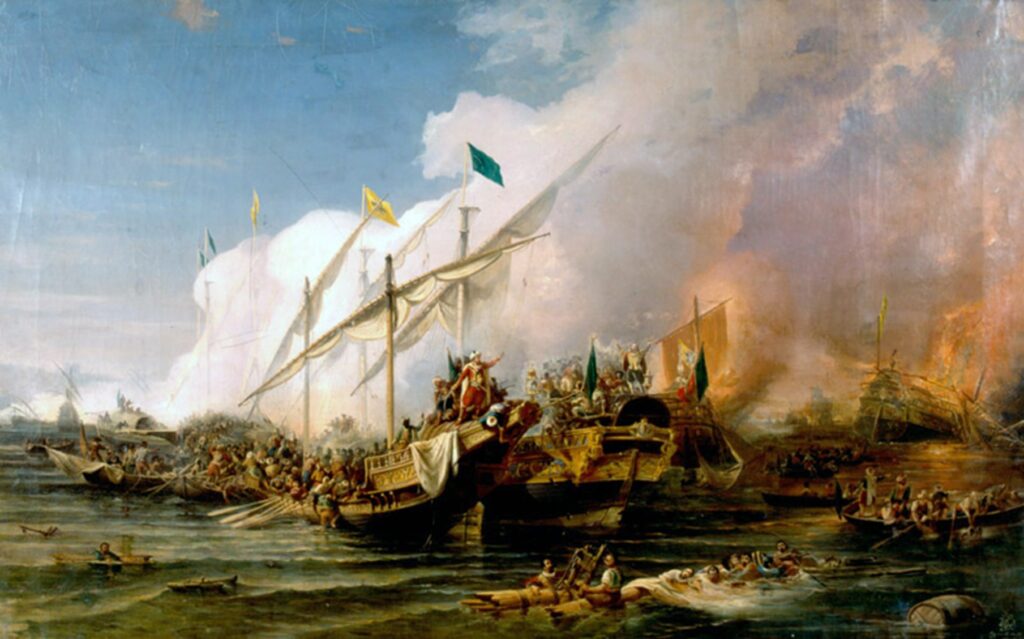
Ignatius, Pierre Favre, and Diego Laínez went to Rome, and on their journey Ignatius had several visions that gave him enormous confidence. He never said much about them, but when he was praying in a tiny chapel called La Storta, he had a vision that gave him an undeniable feeling that God was entrusting him to Jesus in some way. This gave him the confidence that whatever they were about to undertake, they would be successful. He was so excited that he walked to Rome faster than his two friends, despite his limp. While in Rome the three men were busy working with the poor, teaching at the university, and giving spiritual guidance to people. Ignatius led many people in the Spiritual Exercises, including several people who worked at the Vatican. Eventually the seven other friends joined them, and it became clear that they were forming some new group that would do special things. Ignatius once dreamed of doing great things like St. Francis and St. Dominic did, and he was beginning to see that he was starting a new group just like those saints did. But instead of naming the group after himself like the Franciscans and Dominicans did, Ignatius and his friends preferred the name “Company of Jesus,” and they kept referring to each other as “companions in the Lord.”
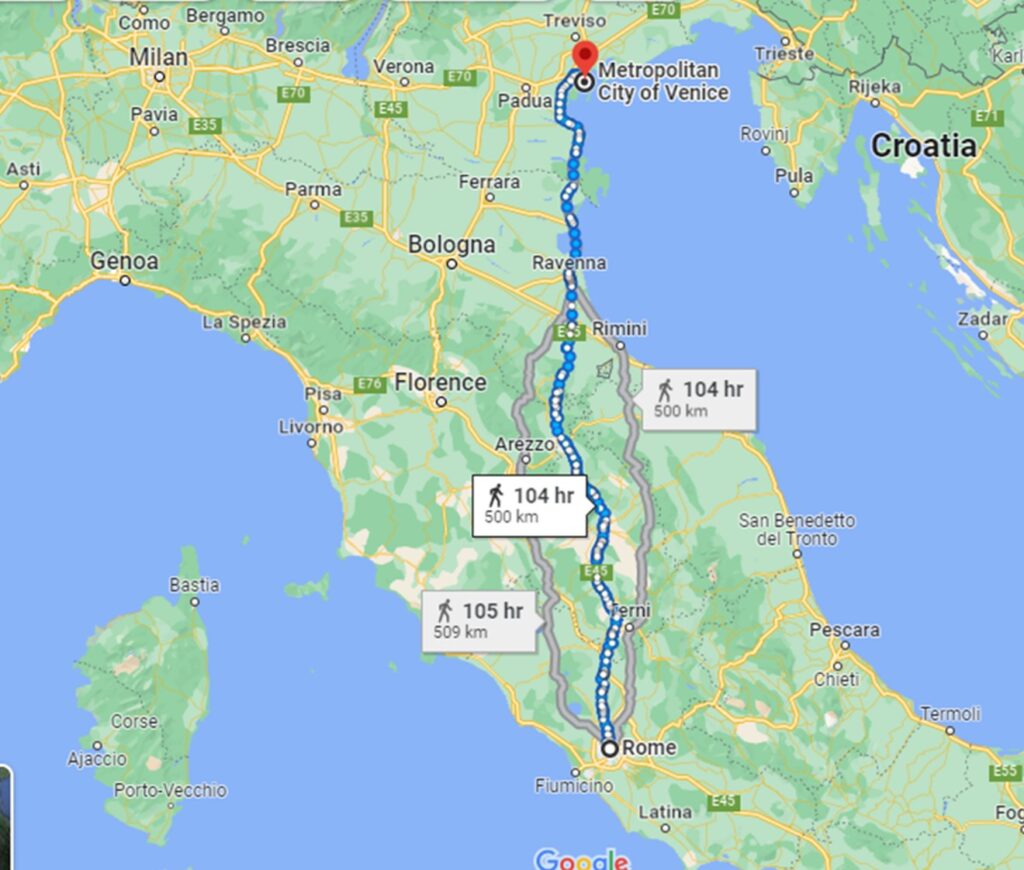
They preached in churches and in public squares, impressing people as a new kind of priests. Many clergy at that time were looking to become rich and powerful since the Church was full of corruption, but Ignatius and his friends were the opposite. They were trying to improve the Church and help regular people. Several corrupt bishops and cardinals tried to stop these “companions,” but the pope wouldn’t listen to them. Instead, he formally recognized them as a religious order in 1540, and he gave them the name “Society of Jesus.” Their nickname would be “Jesuits,” and they would use the letters SJ after their name to represent their religious order.
Their first order of business was to elect a superior-general who would be in charge of their order. It was obvious who it should be, but they held a vote anyway. The first ballot came back with every vote in favor of Ignatius except one. The only person not to vote for Ignatius was Ignatius himself! He was too humble to select himself and kept telling everyone how unworthy he was, and he even started listing the sins he had committed in his life as proof of his unworthiness. His pleading had the opposite effect. They thought this humility was proof that he was the ideal candidate. But he asked them to pray over the matter and vote again, so they did. The results were the same. Ever since they were students in Paris, Ignatius had been their leader. He knew each man personally and worked tirelessly to bring them closer to God. He was the perfect man for the job, so Ignatius stopped objecting and accepted the position of superior-general.
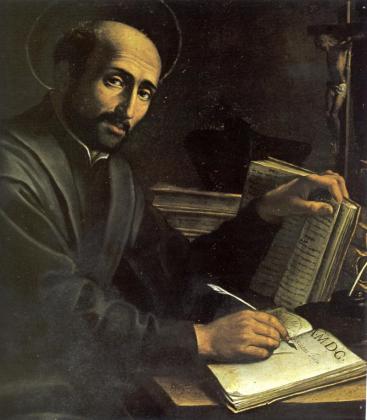
The change in Ignatius’s lifestyle was dramatic. The man who spent years traveling throughout Europe and the Middle East would spend the rest of his life in Rome. He would get out from time to time to preach to people and train the many young men who wanted to become Jesuits. But for the next fifteen years he would be confined to four small rooms in an upstairs office working as an administrator.
Ignatius wasted little time. While the Jesuits awaited approval to become a religious order, many bishops asked for volunteers to serve as missionaries overseas. Ignatius sent several Jesuits to Asia to spread Christianity there, with the most famous being Francis Xavier. Francis converted thousands of people in India and Japan, and he kept in touch with his best friend Ignatius by letter until the day he died. They were oceans apart, but their friendship would never be broken. Later Jesuits would travel to the New World to bring Christianity to the Americas, and several gave their lives in the process.
The plan to travel to the Holy Land never materialized since safe passage could not be found, but the early Jesuits found plenty of other things to do instead. They said their mission was to “help souls,” and they asked the pope to send them to places where the need was greatest, no matter how difficult or dangerous. Besides the overseas missions, Jesuits were sent to the Council of Trent to clean up corruption in the Church and to address the growing conflict between Catholics and Protestants. The Jesuits also became involved in education, and many of the most powerful leaders in Europe requested their sons attend Jesuit schools since these were some of the finest on the continent.
Ignatius also kept busy in Rome. He set up a house for prostitutes called St. Marta, and they helped hundreds of women escape from prostitution and do good things with their lives. Many men in the city were upset by this, including the head postmaster, who was told by the woman he was sleeping with that she was going to live a holy life from now on. The postmaster furiously walked to Ignatius’s house, threw stones at his window, and screamed obscenities at him. A little later on Ignatius established an organization that worked with girls aged 10-12 so that they wouldn’t be lured into becoming prostitutes as they got older. Ignatius also created several orphanages in the area, including the first one established in Rome.
Working at a desk didn’t slow Ignatius down whatsoever. By the time of his death in 1556 he had directed 7500 people in the Spiritual Exercises, with 20% of them being women. He also wrote more than 7000 letters throughout Europe and to various reaches of the globe. One of his best pieces of advice was to do more listening than talking. Ignatius had always been a great listener in his life, and one of the keys to helping people is getting to know them and hearing about their struggles as well as their dreams. As Ignatius grew older he always made time for others, and he continued to have heartfelt one-on-one conversations with people, just like he had in Barcelona, Salamanca, and Paris. Even though he was an intensely spiritual man who would take walks by himself and gaze at nature, his tenderness toward others made him famous. As one of the early Jesuits put it, Ignatius “seemed to be entirely love.”
His health declined significantly when Ignatius reached his sixties, and by 1556 the gallstone attacks were frequent and severe. (The autopsy after his death revealed stones in his gallbladder, kidneys, liver, lungs, plus one of his main arteries, so Ignatius must have suffered a lot.) His fever was also getting out of control, and the bad medical care he received from his doctor made things worse. He could see the end was near, and he asked for someone to get the pope’s blessing for him before he passed away. But it came too late, and Ignatius died on July 31, 1556.

Ignatius’s closest companions were now spread all over the globe, doing everything they could for the greater glory of God. It would take months for the letters to reach them telling them their dear friend Ignatius had passed away. The news would bring them sadness but also joy. They knew Ignatius was still looking over them, watching them from heaven above. They would also remember the example Ignatius had set by his own life. He had been a troublemaker in his youth and pursued all the wrong things, but God had other plans for him. A French cannonball destroyed his dreams and nearly destroyed his life. But instead of sulking over his injury or becoming bitter, Ignatius turned his misfortune into an opportunity. He would become a new man and pursue new dreams. He worked tirelessly on making himself a better person, and this in turn allowed him to help others become better people too. The lives he touched would go on to inspire others, helping to transform the world into a better place one soul at a time.
Reflection Questions:
- Ignatius frequently had his dreams dashed, but then he chose to pursue new dreams. What other dreams will I pursue if life turns out differently than I expect?
- As Ignatius looked back on his life, he realized God had given him numerous blessings. What blessings has God given me over the course of my life, and what can I give to God in return?
Click here for chapter 9
